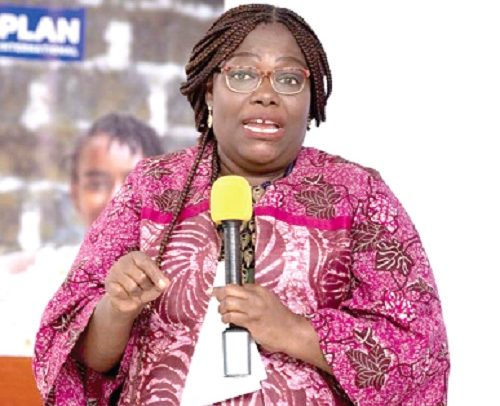Nana Oye Bampoe Addo
Free Senior High School (SHS) which was introduced by government in 2017, according to Nana Oye Bampoe Addo, has increased enrolment in schools for both boys and girls.
She was speaking last week at the Ghana Registered Nurses Association during the recent International Women’s Day activities on the theme “Invest in Women: Accelerate Progress”.
On how investing in women in education, health and gender-based violence has helped to progress and advance the cause of women, especially in protecting women’s rights, she said that in terms of education, gender parity between boys and girls was achieved in primary school and secondary school enrolment in 2015 and 2020 respectively.
She added that “various mechanisms were employed by government and stakeholders to ensure access to education for girls.”
The investment in girls’ education, she told her audience, “has enabled the achievement by Ghana’s gender parity in school enrolment for girls and boys. I repeat, this was through investment, careful planning, and strategy. In 1995, the then Government of Flt Lt. Jerry John Rawlings adopted the Accra Accord on Girls Education National Plan 1995 to 2005.Through this strategy, the Girls Education Unit, now Girl’s Education Directorate was created by the Ministry of Education. It was created within the Basic Education Division of the Ghana Education Service (GES) in 1997. I salute Professor Djangmah, and his colleagues for this major feat. The key objective of girl’s education in Ghana in 1997 was to increase participation of girls in STEM by improving quality of teaching.”
The underlying argument and justification for adopting a strategy to focus and invest in girls’ education, she said, was that “investing in girls’ education, was the most cost effective measure in a developing country to improve the standard of living”. The STEM statistics showed that in Ghana, out of 3,000 ranked best scientists, only 285 were women, that is, 9.8 percent, she added.
Continuing, she said that investments made in girls STEM education included creation of STEM clinics by UNESCO in selected districts in Ghana, adding that “a Girls in ICT programme by the Ministry of Communications and Digitalisation was also commenced and, 9,000 girls have been trained so far. Huawei in Ghana also commenced the Seeds for the Future Programme and trained 25,000 girls in SHS in cyber security and privacy protection.”
This investment over three decades, according to the former Gender Minister, “has led to gender parity in 2015. Enrolment in primary education for girls increased from 2 million in 2014 to 2.3 million in 2022, with an increase of 15.1%. Enrolment in secondary school education for females increased from 1 million in 2014 to 1.6 million in 2022, an increase of 52.1 %. Much more needs to be done in increasing the enrolment of girls in tertiary institutions, especially in STEM.”
With respect to STEM and girls, she recognised the achievement of Prof. Nana Ama Brown Klutse, the first female head of the Department of Physics at the University of Ghana, the youngest female Professor of Physics in Ghana, and the only African on the UN Committee on Climate Change, pointing out that “making the right investment in education reaps these pleasurable fruits.”


